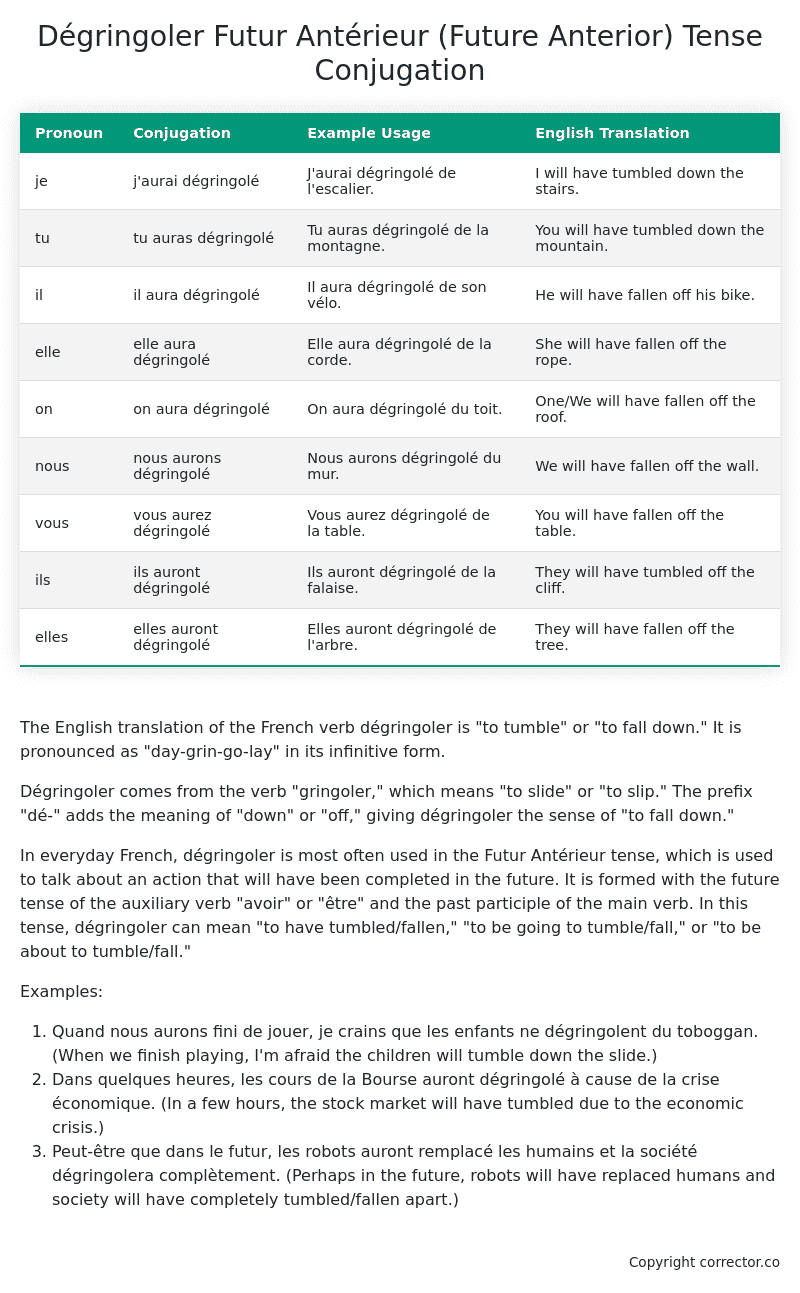Futur Antérieur (Future Anterior) Tense Conjugation of the French Verb dégringoler
Introduction to the verb dégringoler
The English translation of the French verb dégringoler is “to tumble” or “to fall down.” It is pronounced as “day-grin-go-lay” in its infinitive form.
Dégringoler comes from the verb “gringoler,” which means “to slide” or “to slip.” The prefix “dé-” adds the meaning of “down” or “off,” giving dégringoler the sense of “to fall down.”
In everyday French, dégringoler is most often used in the Futur Antérieur tense, which is used to talk about an action that will have been completed in the future. It is formed with the future tense of the auxiliary verb “avoir” or “être” and the past participle of the main verb. In this tense, dégringoler can mean “to have tumbled/fallen,” “to be going to tumble/fall,” or “to be about to tumble/fall.”
Examples:
- Quand nous aurons fini de jouer, je crains que les enfants ne dégringolent du toboggan. (When we finish playing, I’m afraid the children will tumble down the slide.)
- Dans quelques heures, les cours de la Bourse auront dégringolé à cause de la crise économique. (In a few hours, the stock market will have tumbled due to the economic crisis.)
- Peut-être que dans le futur, les robots auront remplacé les humains et la société dégringolera complètement. (Perhaps in the future, robots will have replaced humans and society will have completely tumbled/fallen apart.)
Table of the Futur Antérieur (Future Anterior) Tense Conjugation of dégringoler
| Pronoun | Conjugation | Example Usage | English Translation |
|---|---|---|---|
| je | j’aurai dégringolé | J’aurai dégringolé de l’escalier. | I will have tumbled down the stairs. |
| tu | tu auras dégringolé | Tu auras dégringolé de la montagne. | You will have tumbled down the mountain. |
| il | il aura dégringolé | Il aura dégringolé de son vélo. | He will have fallen off his bike. |
| elle | elle aura dégringolé | Elle aura dégringolé de la corde. | She will have fallen off the rope. |
| on | on aura dégringolé | On aura dégringolé du toit. | One/We will have fallen off the roof. |
| nous | nous aurons dégringolé | Nous aurons dégringolé du mur. | We will have fallen off the wall. |
| vous | vous aurez dégringolé | Vous aurez dégringolé de la table. | You will have fallen off the table. |
| ils | ils auront dégringolé | Ils auront dégringolé de la falaise. | They will have tumbled off the cliff. |
| elles | elles auront dégringolé | Elles auront dégringolé de l’arbre. | They will have fallen off the tree. |
Other Conjugations for Dégringoler.
Le Present (Present Tense) Conjugation of the French Verb dégringoler
Imparfait (Imperfect) Tense Conjugation of the French Verb dégringoler
Passé Simple (Simple Past) Tense Conjugation of the French Verb dégringoler
Passé Composé (Present Perfect) Tense Conjugation of the French Verb dégringoler
Futur Simple (Simple Future) Tense Conjugation of the French Verb dégringoler
Futur Proche (Near Future) Tense Conjugation of the French Verb dégringoler
Plus-que-parfait (Pluperfect) Tense Conjugation of the French Verb dégringoler
Passé Antérieur (Past Anterior) Tense Conjugation of the French Verb dégringoler
Futur Antérieur (Future Anterior) Tense Conjugation of the French Verb dégringoler (this article)
Subjonctif Présent (Subjunctive Present) Tense Conjugation of the French Verb dégringoler
Subjonctif Passé (Subjunctive Past) Tense Conjugation of the French Verb dégringoler
Subjonctif Imparfait (Subjunctive Imperfect) Tense Conjugation of the French Verb dégringoler
Conditionnel Présent (Conditional Present) Tense Conjugation of the French Verb dégringoler
Conditionnel Passé (Conditional Past) Tense Conjugation of the French Verb dégringoler
L’impératif Présent (Imperative Present) Tense Conjugation of the French Verb dégringoler
L’infinitif Présent (Infinitive Present) Tense Conjugation of the French Verb dégringoler
Struggling with French verbs or the language in general? Why not use our free French Grammar Checker – no registration required!
Get a FREE Download Study Sheet of this Conjugation 🔥
Simply right click the image below, click “save image” and get your free reference for the dégringoler Futur Antérieur tense conjugation!

Dégringoler – About the French Futur Antérieur (Future Anterior) Tense
Construction
Common Everyday Usage Patterns
Interactions with Other Tenses
For example
Summary
I hope you enjoyed this article on the verb dégringoler. Still in a learning mood? Check out another TOTALLY random French verb conjugation!


